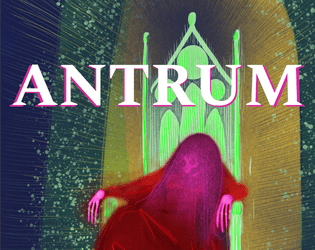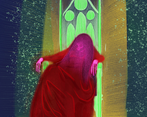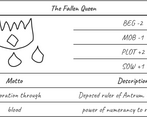Play game
Antrum's itch.io pageResults
| Criteria | Rank | Score* | Raw Score |
| How captivating the tone, feel and style of the game are | #6 | 3.703 | 4.000 |
| How strongly maps are integrated into the game’s design | #6 | 4.166 | 4.500 |
| How easy to understand and use the game’s rules are | #9 | 3.395 | 3.667 |
| How elegant the game’s design is | #10 | 3.240 | 3.500 |
| How well the game fits the theme and goal of the jam | #10 | 3.549 | 3.833 |
Ranked from 6 ratings. Score is adjusted from raw score by the median number of ratings per game in the jam.
Leave a comment
Log in with itch.io to leave a comment.









Comments
Antrum is a game that is delightfully weird. The setting is evocative and the rules text manages to be atmospheric while still being easy to understand. The game is inspired by a number of classic games in the map-making, faction-driven genre (The Quiet Year, Microscope, Kingdom) but manages to stand on its own legs. I think it is a promising game and one that is worth developing if you feel like continuing to work on it, so in the interest of that, I would like to offer some (hopefully constructive) pieces of criticism. Feel free to disregard any of this, of course, and as I said, I think it a fine game!
It’s interesting to me that the game sets out to be clearly competitive, pitting the factions and players against each other, even if the caveat is there that you are playing to create an interesting story. One part of this that I am curious about, as I have not had the chance to play the game yet, is how voting for the Fabulist would work. I like that it’s done as a ritual, but I am a little bit worried about the fact that you are voting for an aspect of player skill. I think with most groups this will probably not be a problem, but playing with people you don’t know so well, or players who are new to narrative games, or more introverted or less verbal players, there is a small risk of the voting being a bit uncomfortable for some.
I like the faction attributes, they are amazingly on theme, and the way they are assigned, but they could maybe be more clearly tied to different actions? On the other hand, having it more loosely defined by what fits best gives a lot of narrative freedom, so I’m not sure. But it will require that players are on the same page about what stat goes with what described action.
Thank you for this entry, I really enjoyed it! I also want to say that I really liked the presentation: the art, layout, quotes and text worked harmoniously together in this strange and fascinating bone world! :-)
Hi Lari! Thanks for the detailed review. I definitely plan on continuing to work on this with a revision from jam comments and some playtesting.
I agree the competitive nature and the Fabulist mechanic introduces some challenges. That was one of the main pieces of feedback I received during the one playtest I managed to schedule before submitting the game. One player was heavily motivated by mechanics and the board game elements, and I wanted a way to win without being the most popular player, but strictly through winning opposed rolls and manipulating the board. Another player brought up the point that shy or quiet players might be at an unfair disadvantage. I will definitely think about this for revisions and will consider including other win conditions or some sort of mechanic for "stealing" the Fabulist position rather than earning it democratically. If I don't find a satisfactory solution, I will probably just make it explicit in the rules that you have to A) be prepared to use the spotlight when you are in it (i.e. it might just not be a good game for new fiction-first gamers) and B) when someone has the spotlight, you have to let them use it without interrupting.
I agree the list of actions associated with faction statistics could be improved - I received this feedback from other reviewers also. I plan on updating that section to more clearly distinguish the statistics.
Thanks again for your feedback and the opportunity to read your game, Berlin '70 – Capital of Spies!
Hi Sam,
I'm very into the art here, and I like what you've done to make that Microscope-style discovery geographical. (Have you seen "I'm sorry did you say street magic?", a recent zinequest game? You've come to some interesting similarities and differences in how the two games approach the same urge). You've got some great feedback already that I'll not repeat, but I did make a couple of other notes.
Your stats have very evocative names. I worry slightly that there might be an overlap between manipulate (plot) and foster dissent (sow), but I grew up with arguments over whether a certain action was INT or WIS and we always settled it. It feel to me like plot is preparatory, whereas sow is active, which would probably be enough to settle any arguments.
In the 'opposed rolls' section, I see a 'may' that leads to it being possible to have an opposed roll called for but no player wanting to do the opposition. What happens in that case? Fabulist is compelled to step in?
Is it possible to destroy a District that has a Haunt in? It seems like it would be yes, but the Haunt would somehow survive.
re your list of adjectives; you could have two D66 lists, keeping the options there but not giving blank lines for the other columns.
thanks for the entry, I enjoyed reading very much.
Hi @scopperil! Thanks for the review, this is all very helpful.
I did not see i'm sorry did you say street magic! It looks really good, and I'm surprised at some of the similarities. I'll have to grab a copy.
I see now that plot and sow could have unproductive overlap. I'll reconsider the wording of the stat descriptions in revisions to see if I can add a bit of distinction. I definitely saw sow as being more directly related to the population of Antrum outside the faction - gaining the trust or spreading rumors among the community. Plot I see as more of a sneaky faction action, maybe sneaking into another faction's territory or HQ, or gathering intel on a person/place/thing, etc. I'll try to make that clearer.
I think opposed rolls being optional is for the case where the other players are ok with an action happening unopposed - they think it will lead to a more interesting outcome or they think it is boring or more of a setup action and don't want to linger. I can check that section to see if the optional nature could lead to problems.
The destroying Districts point is a really good catch. I missed this possibility. I will add a section saying if a District with a Haunt is destroyed, the player with the Haunt can relocate the Haunt as they wish. I suppose it could be an opportunity to revise the name of the Haunt also...
Two d66 lists could be good. I was trying to conserve paper and had uneven numbers of ideas for the different columns. I'll think on that.
Thanks again for your feedback! I appreciate it.
I don’t have good English writing skills. I still hope to make myself understood in this comment.
I also leave below an Italian translation of the comment, for those who want to follow the discussion anyway.
Hi Sam, congrats for the game!
There are some points that make this entry a link between 2 worlds: the role-playing game and the board game. Very interesting!
I would like to ask you a few questions, which can help me better understand your game:
1- What happens if at the beginning of the game there is no Fabulist (i.e., if all the players vote the player on the left)?
2- The game has some board game-like management components.I like it, but I’m afraid players will only focus on one of the two parts (role playing or tactical playing).
I haven’t played it, but I ask you anyway: have you already thought of some way to make the two ways of playing this game more ““harmonious””?
Do players have a way to apply more roleplay during worker placement or Goon management?
I’ll also leave you a couple of notes: 1- Warning: the event table wants players to roll 2d6 (also reported by Esteban / Hardcore Narrativist), it means that you can never “Destroy a district”. 2 - Is the Random Table finished or will you insert more words? (4000 as the jam limit are few in this case)
Have you thought about trying to use a d66 (1d6 for the tens and 1d6 for the units)?
I hope you’ll keep working on it, it could be a really nice bridge between two completely different ways of playing the table.
Bye!
Ciao Sam, complimenti per il gioco!
Ci sono alcuni punti che lo rendono un anello di collegamento tra 2 mondi: il gioco di ruolo e quello da tavolo. Molto interessante!
Ti vorrei fare qualche domanda, che può aiutarmi a capire meglio il gioco: 1- Cosa succede se all’inizio del gioco non c’è il fabulist (se tutti i giocatori votano il giocatore a sinistra, per esempio)? 2- Il gioco ha alcune componenti di gestione tipo gioco da tavolo. Mi piace, ma ho paura che i giocatori si concentrino solo su una delle due parti (ruolo o tattico). Non l’ho giocato, ma ti chiedo comunque: hai già pensato a qualche modo per rendere più ““armonioso”” l’insieme dei due modi di giocare? I giocatori hanno un modo per applicare più roleplay durante il worker placement o la gestione dei Goon?
Ti lascio anche un paio di note: 1- Attenzione: la tabella eventi vuole che i giocatori tirino 2d6 (come riportato da Esteban / Hardcore Narrativist), vuole dire che non si potrà mai “Distruggere un distretto” 2 - La Random Table è terminata o inserirai altre parole? (4000 come limite della jam sono poche in questo caso) Hai pensato di provare a usare un d66 (1d6 per le decine e 1d6 per le unità)?
Spero continuerai a lavorarci sopra, potrebbe essere davvero un bel ponte tra due modi di giocare al tavolo completamente diversi.
Ciao!
Hi Daneile,
Thanks for the comments. It's great to get feedback. Your English is great! Sicuramente meglio del mio italiano... Look out for my comments on Daedalus soon.
1. Great point - I had only considered ties among a subset, not a 1-vote-per-player tie. I will clarify that during revisions. I think I would say you must decide turn and action order randomly until a Fabulist is chosen.
2. It's interesting that one of your takeaways was the game's nature as a hybrid board-game RPG. That is definitely true, but from the start I was aiming at a creating a narrative-driven map-game like The Quiet Year! I suppose the number of components and worker placement does move it towards a board game. However, the reward mechanism (being selected as Fabulist) is strictly narrative right now. The "board state" does affect your options for narration though. I'm not sure what direction I would go to try to harmonize those elements. I think I would have to play test more to see what emerged! For example, it is not clear to me right now how much the topology of the board will matter. You will be limited by where you can move your Goons or how many resources you can spend, for sure, but I imagine you might be able to subvert those limits and still find success.
3. Right now the rule state you must describe your Goon, but not their movements. I should add a required narration of movement to fit the other actions, all of which (I think!) require narration.
n1. noted, thank you!
n2. I started to run out of words for faction types (Organization, Group, Company, etc.). Some of the columns are therefore limited - you can still roll on them, but would have to reroll with certain results. It is also meant to be rolled one column at a time, rather than one row at a time. I didn't find a good way to include that instruction on the page, but would like to for revisions. I also found I could keep thinking of more and more nouns and adjectives - I suppose the total number available is pretty high haha. I would definitely want to expand the table in revisions where it make sense. A d66 is interesting - I haven't made many random tables and wasn't sure which approach was best. Because I had so many nouns and adjectives I sort of let those determine the total table size. I had more than 66 for those columns. Another option would be to restrict it a bit to tighten the implied setting, but I sort of like the wild results you can get on the table right now.
---
Ciao Daneile,
Grazie per i commenti È fantastico ricevere feedback. Il tuo inglese è fantastico! Sicuramente meglio del mio italiano ... Presto attenzione ai miei commenti su Daedalus.
1. Ottimo punto: avevo considerato solo i legami tra un sottoinsieme, non un pareggio da 1 voto per giocatore. Lo chiarirò durante le revisioni. Penso che direi che devi decidere a turno e in ordine casuale fino a quando non viene scelto un Fabulista.
2. È interessante che uno dei tuoi take-away fosse la natura del gioco come un gioco di ruolo ibrido da tavolo. Questo è sicuramente vero, ma fin dall'inizio miravo a creare un gioco di mappe basato sulla narrazione come The Quiet Year! Suppongo che il numero di componenti e il posizionamento dei lavoratori lo spostino verso un gioco da tavolo. Tuttavia, il meccanismo di ricompensa (selezionato come Fabulista) è strettamente narrativo in questo momento. Lo "stato di bordo" influisce comunque sulle opzioni di narrazione. Non sono sicuro in quale direzione vorrei andare per cercare di armonizzare quegli elementi. Penso che dovrei giocare di più per vedere cosa è emerso! Ad esempio, non mi è chiaro in questo momento quanto sarà importante la topologia del consiglio. Sarai limitato da dove puoi spostare i tuoi Goon o da quante risorse puoi spendere, sicuramente, ma immagino che potresti essere in grado di sovvertire quei limiti e trovare ancora successo.
3. In questo momento la regola afferma che devi descrivere il tuo Goon, ma non i loro movimenti. Dovrei aggiungere una narrazione richiesta del movimento per adattarsi alle altre azioni, tutte le quali (penso!) Richiedono una narrazione.
n1. Ne ho preso nota. Grazie!
n2. Ho iniziato a rimanere senza parole per i tipi di fazione (Organizzazione, Gruppo, Azienda, ecc.). Alcune delle colonne sono quindi limitate: puoi ancora scorrere su di esse, ma dovresti ripetere il test con determinati risultati. È anche pensato per essere arrotolato una colonna alla volta, anziché una riga alla volta. Non ho trovato un buon modo per includere queste istruzioni nella pagina, ma vorrei fare delle revisioni. Ho anche scoperto che potrei continuare a pensare a sempre più nomi e aggettivi - suppongo che il numero totale disponibile sia piuttosto alto ahah. Vorrei sicuramente espandere la tabella in revisioni dove ha senso. Un d66 è interessante - non ho fatto molti tavoli casuali e non ero sicuro di quale approccio fosse il migliore. Dato che avevo così tanti nomi e aggettivi, ho lasciato che quelli determinassero la dimensione totale della tabella. Ne avevo più di 66 per quelle colonne. Un'altra opzione sarebbe quella di restringerlo un po 'per restringere l'impostazione implicita, ma mi piacciono i risultati selvaggi che puoi ottenere sul tavolo in questo momento.
Thanks for the answer, Sam!
And thanks also for putting an Italian translation for those who want to learn more about your game!
I’ve been thinking about what you say about the topology of the board. Have you thought about making the connections more real?
I mean, if players created on index cards the places far from their territory, but had to link them materially with something?
(I’m thinking sticks, or whatever)
Keep developing it. It’s a very interesting game! Bye!
Grazie della risposta, Sam!
E grazie anche di aver messo una traduzione italiana per chi vuole approfondire i commenti al tuo gioco!
Ho pensato a quel che dici della topologia della board. Hai pensato di rendere più reali i collegamenti?
Cioè, se i giocatori creassero su index card i luoghi lontani dal loro territorio, ma dovessero collegarli materialmente con qualche cosa?
(sto pensando a bastoncini, o altro)
Continua a svilupparlo. È un gioco molto interessante! Ciao!
Really nice game overall, and nice and evocative illustrations! Some comments and questions:
1. I assume that the faction's statistics are used for the opposed rolls (it says "whenever you roll the dice" but the statictics aren't mentioned again after the definition). In that case, does the "attacker" choose which stat is used for _both_ players, or can the "defender" choose whichever stat they want?
2. The table of free actions on page 20 is labelled 2d6, and it seems that those are the kind of dice used in the game... but the results are 1-12, instead of 2-12??
3. A "full" example would have been nice! Not a full game, but at least a full round.
4. How many players can play this game? Considering the mechanics of selecting a fabulist, it makes sense that it will be at least three, but I wonder if you have thought about an upper limit. Or maybe you think it should be at least 4, or whatever.
Thanks so much for your comments. These are great. Look out for my comments on Unexplored soon!
1. Good point - this could definitely be clearer. If you look at page 14-15 you can see the explanation as it exists:
"After establishing the bonuses, each player rolls two six-sided dice and adds their bonuses, as well as the modifier from an appropriate attribute matching their description (they choose). Ties go to the opposing Faction."
So, I'm trying to say each faction chooses their own attribute from their Faction Sheet, but it could be clearer. It would be interesting to playtest where the defender gets to choose. I am a bit worried people will just always pick their best stat, since they can try to justify it. However, the reward structure means it doesn't necessarily mean losing is bad - you can lose and still be the Fabulist, but it is probably less likely. Part of the strategy would be in the attacker trying to fictionally position a tough situation for the defending faction. For example, threatening the civilians of a district loyal to one faction might necessitate the defender use Sow or Plot rather than Beg or Mob.
2. Wow, what a rookie move! I'll have to fix that to be 2-12 after the jam.
3. Agreed. I can add in a full example round of play after the jam - that was a "stretch goal" that I didn't hit.
4. I recommended 3-5 players on the front cover. I only had time to playtest one game with 3. I imagine it could accommodate more, but I think it would begin to get quite slow with more than 5. I might explore an alternative 'simultaneous' play style for larger groups where each player basically 'does' their turn and then the descriptions all happen rapid fire around the table afterward. It would just break some of the existing order-dependent mechanics that the Fabulist benefits from.
Just woah